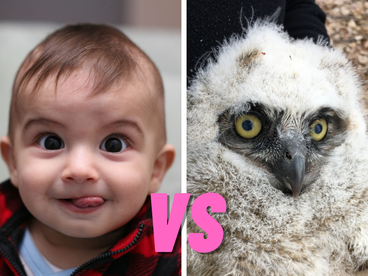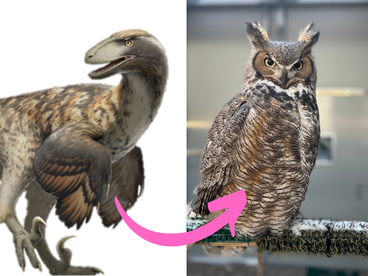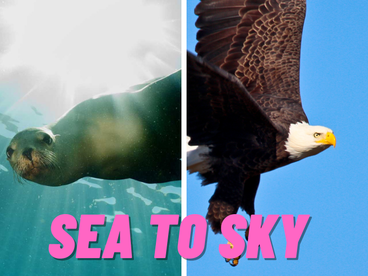
The Wilder Side of Nature is a fun, new series of virtual talks that bring together experts from diverse areas to see how unexpected topics are intertwined. Guaranteed to be fresh and educational fun for the whole family!
Each session is free for you to join thanks to the generous support of Robert and Susan Wilder.

Ever wonder how a raptor baby differs from a human baby? Ok, maybe you haven’t - but we can’t help ourselves for the chance to nerd out on the topic! Humans spend years growing up before separating from parents, while baby owls and eagles are booted out of their nests within their first year of life. Human and raptor babies go through very similar development milestones, just on oh-so very different timelines and with drastically different survival rates.
Join us as we bring together baby medical experts in both the human and avian worlds and look at just what those most important development times are and what life, especially in that first year, looks like.
Register for Growing up Can Be Hard to Do
Presented by:
Dr. Tolu Mckenzie, MD MPH is a Field Director for Infectious Diseases and Vaccines at the Janssen Pharmaceutical Companies of Johnson & Johnson. In this role, she leads the Vaccine Field Based Medical Team for the East to provide scientific, research, and educational support to health care professionals and internal partners related to Janssen vaccine products. Dr. McKenzie is a double board-certified physician in pediatrics and preventive medicine and a CDC – trained epidemiologist, and she has experience leading domestic and international vaccine studies; evaluating scientific data to inform vaccine policy and clinical guidance; and developing and implementing public health programs.
Dr. Annette Ahlmann, DVM, CWR is a raptor medicine and surgery veterinarian at The Raptor Center. Dr. Ahlmann received her DVM at the University of California Davis School of Veterinary Medicine. After graduation, she completed a small animal rotating internship at an emergency and specialty referral center in San Diego. This was followed by an internship in raptor medicine and surgery at The Raptor Center at the University of Minnesota. Dr. Ahlmann is now working with the Partners for Wildlife initiative at The Raptor Center as a research assistant and veterinary resident. Her current research is focused on identifying stress behaviors in red-tailed hawks, with the goal of improving animal welfare for patients during the wildlife rehabilitation process.
Past sessions in The Wilder Side of Nature series

This webinar has aired and is no longer available for registration.
Dinosaurs seem alien. They are celebrities. They’ve been called “Nature’s Greatest Extravagances.” They really are biological superlatives. And…they populate your backyard birdfeeder! Over the past 25 years, nearly everything that we thought we knew about dinosaurs has changed. They are no longer dimwitted icons of extinction. Instead, they are an extraordinarily successful group that pushed the limits of terrestrial body size and even innovated powered flight.
From exciting discoveries in the field to new information gleaned from microscopic investigations of their bones, join us to explore the new and improved dinosaur.
Presented by:
Dr. Kristi Curry Rogers is a vertebrate paleontologist at Macalester College. She specializes in the long-necked dinosaurs called sauropods and has traveled around the globe in search of their bones. Kristi has been awarded an NSF CAREER grant to investigate the effects of environmental stress on the bones of backboned animals (including dinosaurs). She is a member of the Society of Vertebrate Paleontology, and is actively involved in public outreach activities. She has been a consultant and on-screen expert for programs aired on PBS, BBC Horizon, the Discovery Channel, and the National Geographic Channel.
John Sammler is the education program manager at The Raptor Center. Prior to The Raptor Center, John worked as a life sciences teacher for grades 9-12 for over 18 years in Minnesota high schools. Additionally, he has an array of other naturalist work at various natural history museums and nature centers in Minnesota and Pennsylvania. John earned his M.S. in wildlife conservation from the University of Minnesota and a B.S. in wildlife and fisheries sciences from Pennsylvania State University.

This webinar has aired and is no longer available for registration.
In a world more connected than ever before, when we put pressure on one part of our ecosystems, it results in changes to the rest. Human, animal, and environmental health are all intricately connected and emerging threats like infectious diseases and environmental contamination impact us all. We can look to "sentinel animals" to tell us vital information about what is happening in our ecosystems so we can work to address threats earlier and protect our future.
Join us as we look to marine mammals of the sea (seals and sea lions) and to raptors of the sky (bald eagles and peregrine falcons) to learn more about our shared environment and the overall health of our ecosystems.
Presented by:
Dr. Dominic Travis, DVM, MS is the Chief Program Officer for The Marine Mammal Center in Sausalito, California. In this role, he supports the Center’s mission to advance global ocean conservation through marine mammal rescue and rehabilitation, scientific research and education. He believes that sustainable ocean ‘ecosystem health’ cannot be separated from human values and decisions. Professionally, Dr. Travis was originally trained as a marine biologist, and then in veterinary public health and wildlife epidemiology. His research encompasses a diverse set of issues at the human-wildlife interface - most recently wildlife trade (terrestrial and aquatic). He is advisor on biosecurity at the wildlife interface to the US government and many partners in global health.
Dr. Victoria Hall, DVM, MS, DACVPM, serves as the Executive Director of The Raptor Center and as the Redig Endowed Faculty Chair in Raptor and Ecosystem Health at the University of Minnesota's College of Veterinary Medicine. She has a background working at the intersection of human, animal, and environmental health, coming most recently from the Smithsonian Institution where she served as the Veterinary Epidemiologist for the National Zoo and as a Public Health Officer for the Smithsonian Institution's COVID-19 response. Dr. Hall formerly served as an Epidemic Intelligence Service Officer for the Centers for Disease Control and Prevention. With experience working with organizations including the Food and Agriculture Organization of the United Nations and the United States Department of Agriculture, Dr. Hall is passionate about working on complex ecosystem health challenges on a global scale and engaging stakeholders and partners of all levels. She is diplomate in the American College of Veterinary Preventive Medicine and received her Doctor of Veterinary Medicine and her Masters of Science (Veterinary Preventive Medicine) from Mississippi State University.